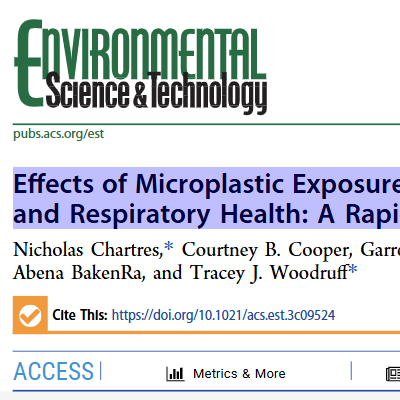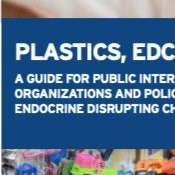
Microplastics in the bloodstream can induce cerebral thrombosis by causing cell obstruction and lead to neurobehavioral abnormalities
We show that circulating MPs are phagocytosed and lead these cells to obstruction in the capillaries of the brain cortex. These blockages as thrombus formation cause reduced blood flow and neurological abnormalities in mice. Our data reveal a mechanism by which MPs disrupt tissue function indirectly through regulation of cell obstruction and interference with local blood circulation, rather than direct tissue penetration.

Effects of Microplastic Exposure on Human Digestive, Reproductive, and Respiratory Health: A Rapid Systematic Review
We concluded that exposure to microplastics is “unclassifiable” for birth outcomes and gestational age in humans on the basis of the “low” and “very low” quality of the evidence. We concluded that microplastics are “suspected” to harm human reproductive, digestive, and respiratory health, with a suggested link to colon and lung cancer. Future research on microplastics should investigate additional health outcomes impacted by microplastic exposure and identify strategies to reduce exposure.

Co-exposure of ferruginous components of subway particles with lipopolysaccharide impairs vascular function: A comparative study with ambient particulate matter
The study shows plastic exposure as a significant CVD risk factor regardless of duration. It leads to changes in myocardial tissue, gut microbiota, and metabolites, all closely tied to CVD.

It’s as If They’re Poisoning Us’: The Health Impacts of Plastic Recycling in Turkey.
Plastic recycling in Turkey is harming the health of many people and degrading the environment for everyone, Human Rights Watch said in a report released today. The 88-page report, “‘It’s as If They’re Poisoning Us’: The Health Impacts of Plastic Recycling in Turkey,” documents the consequences of the Turkish government’s ineffective response to the health and environmental impacts of plastic recycling on the right to health.

First Evidence of Microplastics in Antarctic Snow
In recent years, airborne microplastics have been identified in a range of remote environments. However, data throughout the Southern Hemisphere, in particular Antarctica, are largely absent to date. We collected snow samples from 19 sites across the Ross Island region of Antarctica. Suspected microplastic particles were isolated and their composition confirmed using micro-Fourier transform infrared spectroscopy (µFTIR).

Plastics, EDCs & Health
A guide for public interest organization and policy-makers on endocrine disrupting chemicals and plastics.

Plastics Pose a Threat to Human Health
Authoritative reports shows plastics and microplastics are pervasive sources of exposure to dangerous endocrine-disrupting chemicals.

Plasticenta: First evidence of microplastics in human placenta
Microplastics are particles smaller than five millimeters deriving from the degradation of plastic objects present in the environment. Microplastics can move from the environment to living organisms, including mammals. In this study, six human placentas, collected from consenting women with physiological pregnancies, were analyzed by Raman Microspectroscopy to evaluate the presence of microplastics.

Plastic and Health: The Hidden Cost of a Plastic Planet
This report provides a detailed overview of the health impacts associated with plastic at every stage of its supply chain and lifecycle, and it reveals the numerous exposure routes through which human health is impacted at each stage.

What’s in the Package? Unveiling the Toxic Secrets of Food and Beverage Packaging
Unveiling the toxic secrets of food and beverage packaging.

